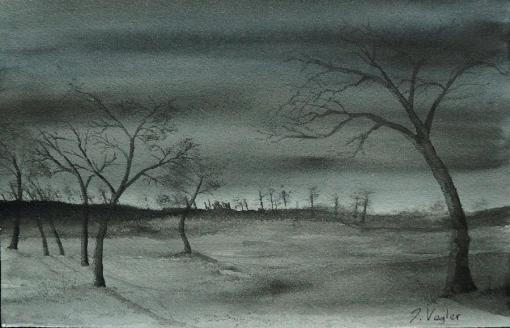
‘Bleak No. 2’ by David Vogler
Five years ago I was asked by a researcher at the Australia National University, Joe Duggan, how I ‘felt’ about climate change.
This was part of an original initiative that put a human face on the scientists working on elements of one of society’s greatest existential threats.
Thus, Is This How You Feel? became a massive success in terms of bringing to the world the idea that scientists are also deeply affected by what they see happening around them.
Five years later, Joe asked me and all the other scientists who participated to provide an update on how we feel.
Here’s what I wrote:
Dear Joe,
Having just re-read my contribution from five years ago, I am compelled to admit that my feelings haven’t changed a lot since then.
While anger is still my over-arching emotion, my state of mind has metamorphosed from raw, potent fury into something more akin to existential malaise. As many of my colleagues have expressed better than I could, the grander realisation that climate disruption is not only real, but has immediate, negative repercussions for the state of world, is now permeating society much more than five years ago.
Yet, we remain paralysed by the legacy of decades of inaction, sustained primarily by the short-termism and financial profiteering that are central to our misnomered ‘democracy’. The corrupt political structure crafted around the pillars of resource exploitation, coupled with a massive and increasing global human population boil down to new sentiments of desperation and bleakness.
I simply cannot see how we will avoid catastrophe. The events of this summer alone are evidence of but the tip of the iceberg to come.
Few scientists in my field are still seriously considering avoidance of environmental collapse; instead, the dominant discourse is centred on damage control. Once one accepts that catastrophe is inevitable, it brings a certain clarity that fury cannot.
As a result, I have shifted to a state of deep melancholy surrounding my resentment, but it is a melancholy with a purpose — I will devote the remainder of my career and life to repairing as much of the damage as I can, while literally admitting that for the most part, I will fail.
Professor Corey J. A. Bradshaw, Matthew Flinders Fellow in Global Ecology, Flinders University



[…] before much of the world morphed into the weirdness that now dictates all facets of life, I wrote an update for the Is This How You Feel project led by Joe […]
LikeLike
Surely, then, populations density is the required discussion. We are, simply, too many. Are there any academic folks considering this issue? For sure we will not get smarter, better, nicer…certainly not the time to evolve such behaviors. So we must work with what we have that might mitigate our footprint: Population reduction. However, War, Disease, & Famine will reduce the pop quite well. Can we imagine a better strategy?
“Whatever energy path is followed by individual regions of the world, one thing remains certain: as long as human population continues to grow, there will eventually be too many of us to extract energy from the limited resources available without doing irreversible environmental damage to the Earth.”
(Energy, Physics and the Environment; p422; U. of Guelph, Dept. of Physics; 1994; EL McFarland, JL Hunt, JL Campbell)
Regards, Larry Williams
LikeLike